Developing a mobile app is expensive and time-consuming. On top of that, there are millions of them out there.
What does that mean for you?
If you want to stand out, you need to focus on developing a solid mobile app promotion strategy.
In fact, breaking into the app market requires an in-depth understanding of consumer behavior and extensive planning.
It’s tough turf. But having a presence on mobile devices has become a necessity for most businesses.
Furthermore, 88% of the more than 4 hours US adults spend with mobile internet daily happens on apps.
Table of Contents
So, how can you make the most out of the app boom?
Apart from building a high-quality mobile app, you should know how to promote it effectively.
In this post, I will explain six of the best mobile app promotion strategies that give proven returns:
Ready to get started?
How Can You Promote Your Mobile App Effectively?
The mobile app marketplace has stiff competition.
For example, the month of February 2021 alone saw a release of 29.5 thousand mobile apps in the Apple App Store.
And, that’s just one app store.
So, it makes sense you need a solid mobile marketing strategy to stand out in the app world. And here are some of the most effective mobile app promotion strategies you can use:
1. Know Your Target Audience
This is the Holy Grail of marketing. You can’t promote your product unless you know who your customers are and what they like. The same holds true for mobile app promotion strategies.
How can you do this?
Instead of trying to reach everyone, focus on reaching your target audience.
Define the demographics, age groups, interests, and lifestyles of your ideal group of customers. These details can give you insights into which marketing strategy you should use for your mobile app promotion.
At the same time, also look at what your competitors are doing to attract more customers. They are likely to have a similar target audience. So, even before you start promoting your app, you can get a fair idea of how to attract customers. Look at their process and try to improve upon it.
2. Start Mobile App Promotion Before the App Launch
For most physical products, the marketing department gets active once conceptualization and prototypes are ready. That’s where mobile apps are different. Even before you launch your app, you need to start promoting it.
Why, you ask?
Marketing your app early has two main advantages — increasing brand awareness and getting feedback. It allows you to engage potential customers and ask them what they’d like to see in the app.
If you’re beta testing already, encourage them to use the app and give you feedback. Listen to what they have to say and identify areas that you can improve upon. After all, you want to make sure your app meets the needs of your ideal customers.
3. Leverage Your Blog
Your website can be a great asset for your mobile app marketing. In fact, it’s a communication channel that can help you create brand awareness, build authority, and increase visibility.
If you already have a website that gets a large amount of traffic, it’s a bonus. You can use the platform’s reach to put the spotlight on your app. One way is simply by posting app screenshots.
Want to know how?
There are multiple ways of leveraging a website as part of mobile app promotion strategies. Take a look at some of the options you can try:
Blog Posts
One in four app users discovers apps through a search engine. According to Google, search is especially crucial for apps related to technology, travel, and local services.
That means you can’t just rely on word-of-mouth and social media channels to reach out to your potential customers. You need to make sure your app is visible on the search engines as well. It’s clear that your mobile app promotion strategy is indirectly linked to your SEO strategy.
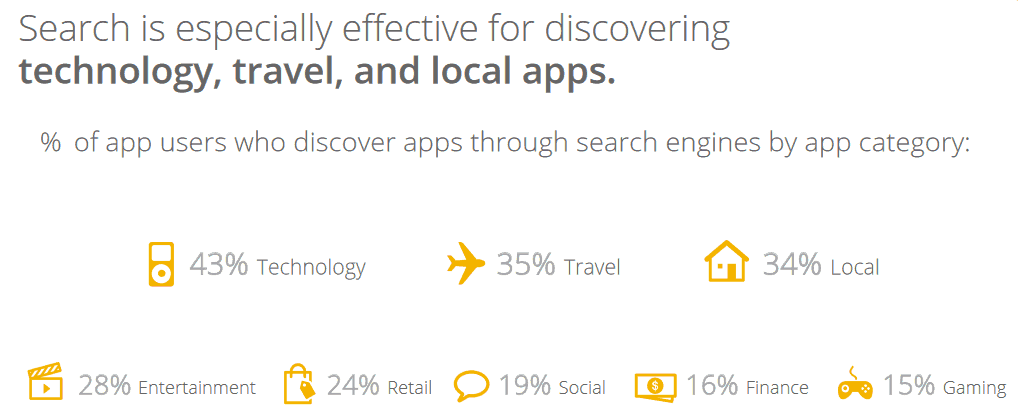
A blog is one of the best ways to keep people updated about your new app and build your online presence. It’s also a good place to share regular blog posts detailing your mobile app’s key features and uses.
You can also share your experiences while creating the app or ask for your audience’s input. The aim is to make them feel involved in the process. Not only will this keep them informed but also build interest around your app.
In addition to this, use relevant keywords and get quality backlinks to improve your site’s Search Engine Optimization.
Don’t forget to add an app install CTA at the end of your blog post.
Clicking the link should take people to the install page of your app. Create a great landing page that highlights the value proposition of your app and compels people to click the Install button.
Leverage landing page builders that enable you to create a highly converting page.
But what should your optimized landing page contain?
- A catchy headline
- Your app name
- Call-to-action
- Body copy explaining the value and benefits of the app. For example, if promoting a business app, your copy should answer your clients' questions and satisfy the reason they visited your landing page.
- Attractive product video and images enhancing your body copy story
- Social proof, e.g., testimonials, reviews, app recognitions and awards, number of downloads and users, etc.
Website Banners and Call-to-Action Buttons
Want to know a secret?
Website banners are typically associated with paid ads. But you can leverage them as a part of your mobile app promotion strategy as well.
Make a web banner announcing the launch of your mobile app and ensure it stands out by placing it on the top section of your home page.
This strategy is great for informing people about your mobile app launch. However, if your app is available in the app store, your goal should be to boost downloads. Take inspiration from Lyft’s mobile app promotion strategy.
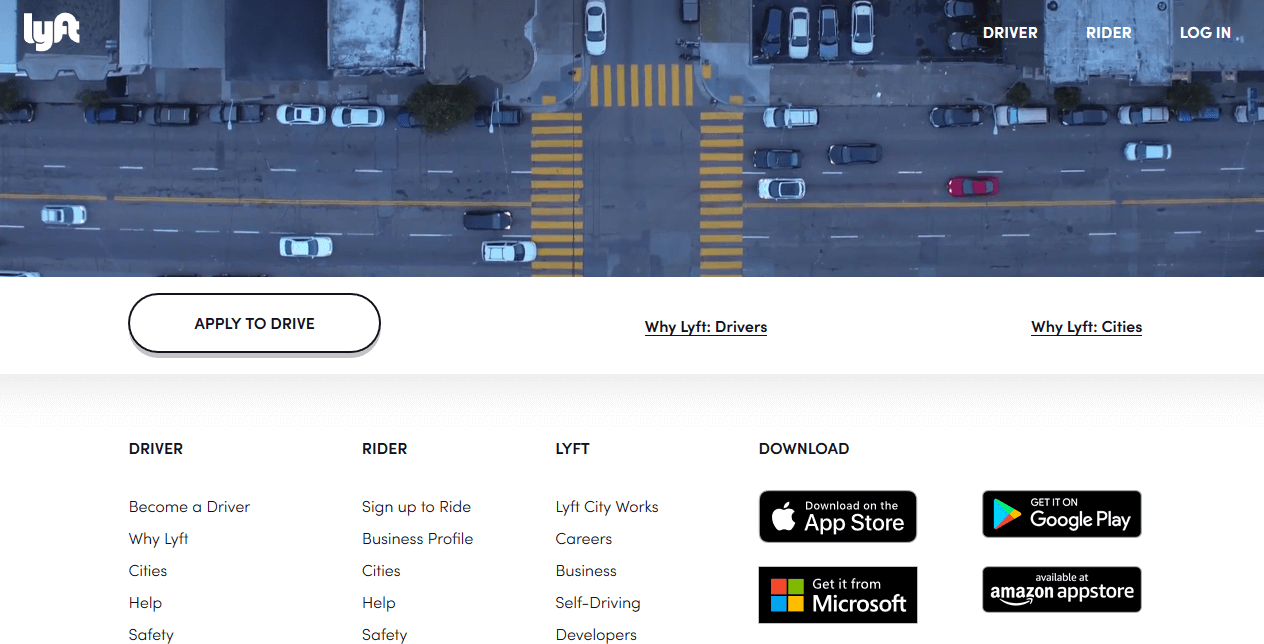
On their homepage, the right corner is solely dedicated to showcasing their apps in different app stores. Simply put, these are prominent call-to-action buttons that drive users to download the app.
4. Send Out Emails
Email marketing is the underdog in the world of marketing. Marketers often overlook it and favor social media promotion. That’s a mistake.
Still not convinced?
It's a strategy that can put you ahead of your competitors.
Here are some statistics that show the merits of marketing with email:
- 99% of email users check their personal inboxes once a day.
- More than 50% of the respondents in the U.S. check their emails more than 10 times a day. Furthermore, they said that they prefer receiving brand updates via emails over other mediums.
- The average open rate of emails worldwide is 22.02% with a CTR of 2.13%.
Clearly, it makes sense that marketing via email can help you reach a broader audience.
But how can you use email as a part of your mobile app promotion strategy?
You can create an email series. In a chain of emails, you can announce the launch date, list the app features, and send subscribers any sign-up offers you may have.
You can also send your subscribers regular newsletters with valuable content on app usage and updates.
Now, we understand that sending emails manually to hundreds of contacts can be a pain. But using email marketing tools can help you segment your email list and create slick emails in minutes. They personalize and optimize your email content and subject line so that your emails grab your contacts’ attention.
After all, you don’t want your app’s great features and all your hard work ignored, right?
For the launch of the All-day 360 Fitness App, Adidas sent out an email telling users what their new app could offer. The email also had CTA buttons that led people to the download link. With this mobile app promotion strategy, Adidas promoted their app as well as drove downloads.
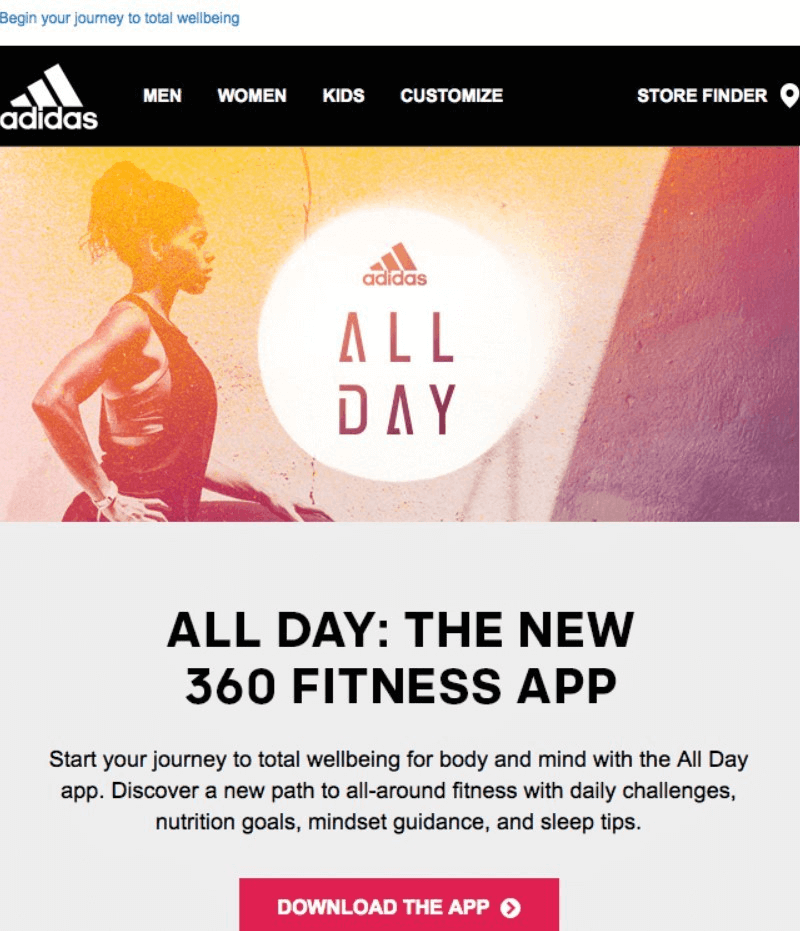
5. Leverage Social Media
Social media is a powerhouse for all kinds of marketing. So, it’s a given that it should be a part of your mobile app promotion strategy.
So how do you leverage social media for new app promotion?
The first thing to do is find out the social media channels that your target audience is most active on. Based on that information, publish content to promote your app on these platforms.
If your target audience is active on multiple social media channels, a social media management tool like HubSpot can come in handy.
It lets you create social content that is aligned with the target network’s guidelines. It also schedules posting for optimal times and tracks engagement rates on each post.
In this way, you can learn how well your app-related posts are performing on each social channel. Using these insights, you can focus your efforts on the channels that are getting maximum traction.
Additionally, you could also use paid ads to reach out to more people and create an instant buzz around your app. Through this mobile app promotion strategy, you can customize your ads solely for your target audience.
It’s an excellent marketing strategy for mobile app promotion because it gives you more control of targeting your audience.
6. App Store Optimization (ASO)
To promote your app successfully, App Store Optimization is one of the key mobile app marketing ideas you need to implement. It’s the process of increasing your app's visibility in app stores like Android's Google Play Store and Apple's App Store.
It's also a great mobile app marketing strategy for businesses that want to increase organic installs, revenue, word of mouth, and conversions.
But what mobile app marketing campaigns can you use for App Store Optimization?
Include keywords in your title and description: Incorporate the keywords naturally in the app store and ensure you have an engaging and memorable name for your app.
Optimize descriptions: Google Play Store indexes and analyzes your descriptions for ranking purposes. For this reason, you should include keywords you want your app to rank for and clearly describe what it does, main features, and any other valuable information.
Use keywords effectively: Keywords play a huge role in App Store Optimization. So, ensure that you choose and focus on keywords your target audience uses when searching across app worlds.
Include a preview video and screenshots: To increase the click-through rates in the app store, choose screenshots that attract attention. Additionally, include a video that helps your app stand out.
Leverage ratings and reviews: These showcase your app's quality and popularity. However, to get them, you have to offer a great user experience. Then, encourage your users to rate and review on the app store.
Analyze and optimize: Analyze your mobile app marketing strategy on the app store and optimize your content depending on results. Keep fine-tuning your mobile App Store Optimization efforts if you want to increase downloads, installs, conversions, and revenue.
7. Collaborate With Influencers
Tap into influencers in your niche to reach out to more people and drive engagement. The key to collaboration for mobile app promotion is to find the right influencers in your niche.
Can I be totally honest with you?
Influencer marketing works but finding the right influencer for collaboration can be tricky. It’s easy to be swayed by vanity metrics like an influencer’s follower count. However, mega-influencers who don’t fit your domain or audience demographics won’t effectively promote your app.
An influencer marketing platform like Heepsy helps you find the best-matched influencers. When such influencers promote your app, you can expect good traffic and conversions in the app market.
They’re already creating content for your target audience. So it becomes easy to reach out to users who may be interested in your app. At the same time, a post from an influencer about your app can help you get more downloads in the app world quickly.
FAQs
Q1. What is mobile app promotion?
A. Mobile app promotion refers to all techniques and strategies that can help you communicate about your app to your target audience. It’s how you increase visibility, boost demand, and differentiate your app from others in the market.
Q2. How do I promote my mobile app?
A. The following are strategies you can use when promoting your mobile app:
- Understand who your audience is, their needs, the content they like, and how best to reach them.
- Promote it before the launch.
- Publish blog posts detailing the app’s features and functionalities.
- Promote it via website banners.
- Send out an email series detailing the app’s features, launch date, and any sign-up offers.
- Promote it on social platforms.
- Partner with influencers.
Q3. What are the strategies for first-time app marketing? What type of marketing is the most effective for a mobile app startup?
A. The following are strategies you can use for first-time app marketing:
- Start promoting the app even before launch.
- If in beta testing mode, encourage users to test it and share their experiences. Then use their user feedback to ensure your app meets their needs.
- Use App Store Optimization for page with relevant keywords, a detailed description, quality screenshots, app preview videos, etc.
- Promote it on social platforms.
- Partner with niche influencers.
- Ask users to leave reviews.
Q4. What are the best iPhone app marketing strategies?
A. These are iPhone app marketing metods you can use to increase downloads and popularize your app:
- Analyze competitor apps for functionalities, features, ratings, and reviews.
- Start promoting it before launch.
- Improve your iPhone app’s visibility in App Store search results using relevant keywords, preview videos, app screenshots, etc.
- Cross-promote within other relevant and popular iPhone apps.
- Create search engine optimized blog posts about the app and promote them on social media, forums, etc.
Q5. What are the worst app marketing strategies?
A. Some of the mistakes you should avoid when marketing your app include:
- Over-promising but not delivering.
- Failing to use App Store Optimization for your content in the app stores.
- Not encouraging app reviews from users.
- Not creating an optimized microsite for your app.
- Failing to leverage social media promotions.
- Failing to respond to people’s comments, reviews, suggestions, etc. proactively.
Q6. What are the best low-cost app marketing strategies?
A. The following are app promotional strategies your company can use when operating on a budget:
- Partner with niche micro and nano-influencers.
- Use banner ads and pop-ups on your website to promote the app.
- Create an in-depth blog post about your app.
- Include a footer in all your email communications advertising your app.
- Create a demo video explaining the what, how, and why of your app.
- Upload your app to other app stores besides Google Play.
Q7. How do I promote my app on social media?
A. The following are ways you can use social media marketing to promote your company's app:
- Start a business account on platforms your audience frequents. These can include Facebook, Twitter, Instagram, TikTok, etc.
- Include calls-to-action directing users to download or install your app.
- Share links directing users to a landing page with your app.
- Use attractive app screenshots or images of your app along with the app icon.
- Create countdowns to build anticipation for your launch or new features.
- Share a promo or demo video.
- Leverage features like Stories on Instagram and Facebook to keep your audience engaged.
- Create a Facebook group for your app and use it to collect feedback.
- Ask users to leave reviews on your Facebook page.
- Use relevant hashtags.
- Collaborate with influencers and other brands.
- Use paid ads or a promo code.
Q8. How do you attract users to your apps?
A. The following are mobile app user acquisition strategies you can use:
- Employ App Store Optimization for your content in the app store. Include a memorable title, recognizable app icon or app logo, engaging descriptions, eye-catching screenshots, video, and relevant keywords.
- Use smart banners on your website.
- Create high-quality infographics, videos, ebooks, blog posts, etc.
- Run PPC campaigns, social media ads, interstitial ads, etc.
- Create landing pages designed for conversions.
- Run influencer campaigns.
- Use press and PR to build awareness and drive user installs. Create a press kit for journalists, websites, and bloggers and tailor your pitches to audience needs.
- Share videos on your landing page and social media channels.
- Feature UGC content on social media.
- Use email to hype new features, offer discounts, share product updates, etc.
- Run a referral program.
- Promote on traditional channels, including radio, TV, newspaper, etc.
- Offer free trials and share demos.
Are You Ready to Promote Your Mobile App?
Developing a solid mobile app promotion strategy requires starting to hustle, even before your app is launched.
Reach out to your customers for feedback and get in touch with influencers for collaborations. Use social media, emails, your blog, and other mediums to promote your app and create a buzz around it.
Did we miss any other mobile app promotion strategies? Please share your insights in the comments below.

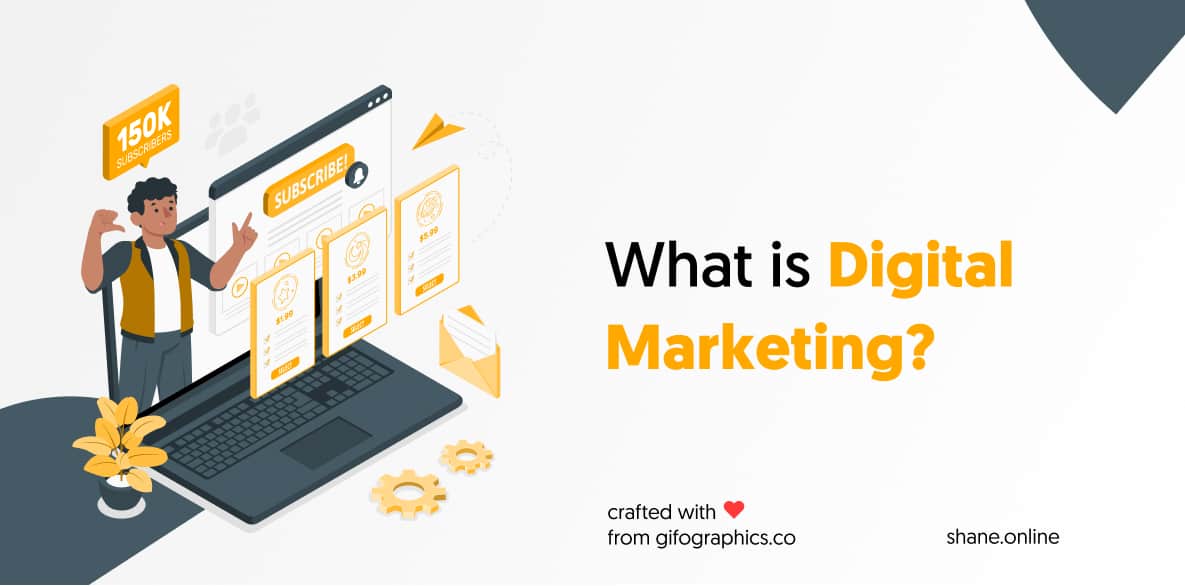
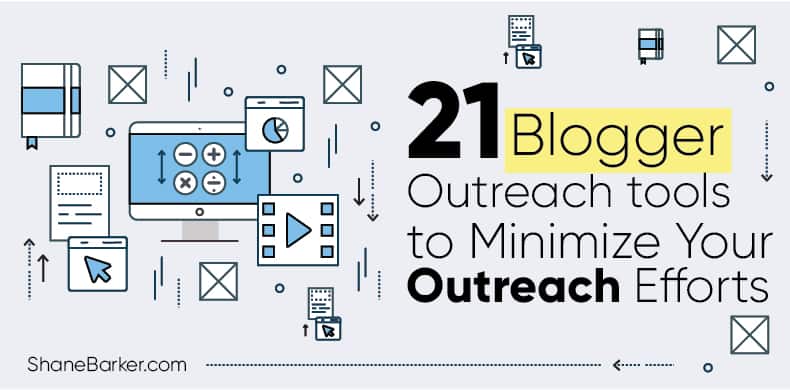
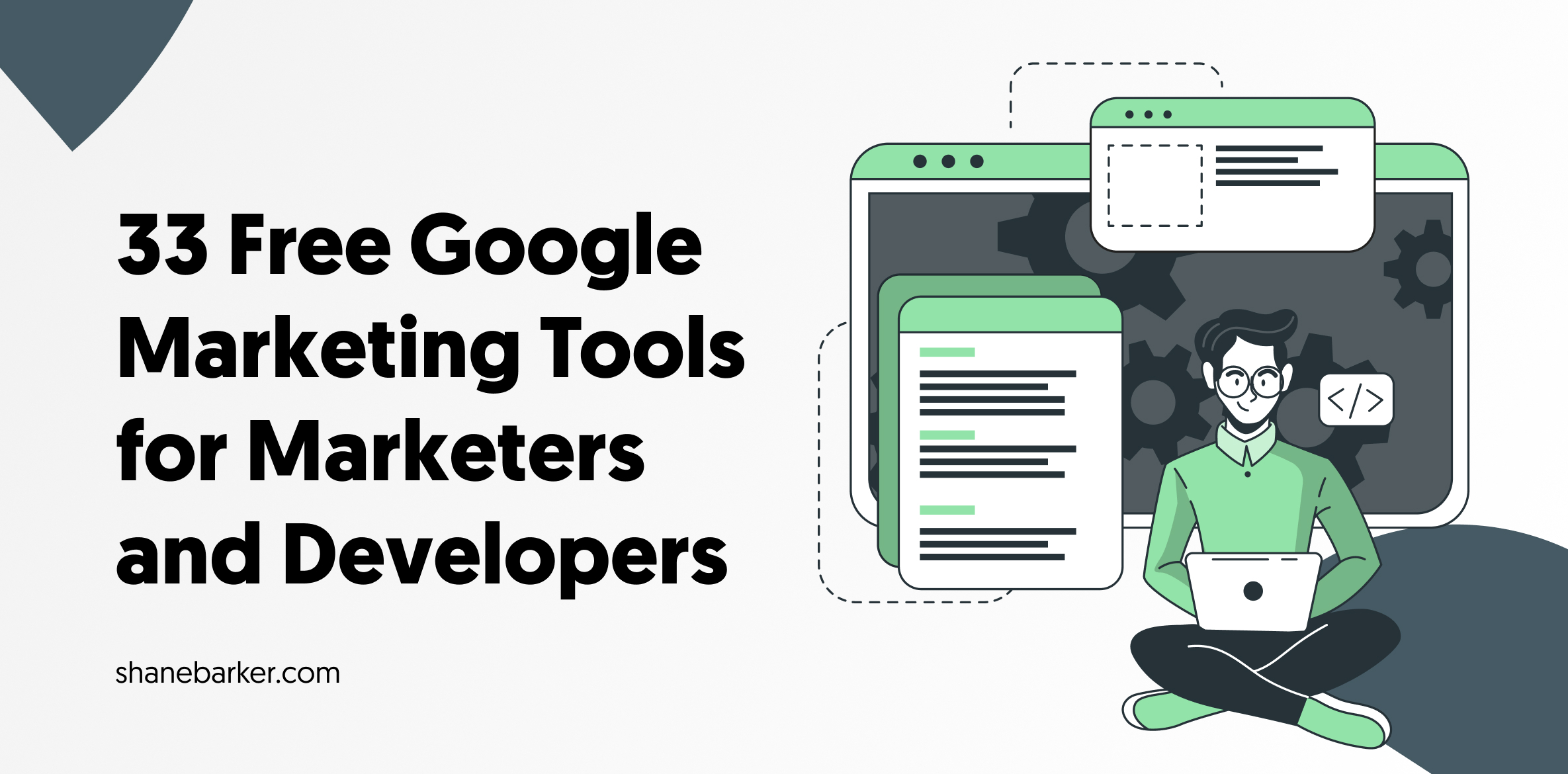
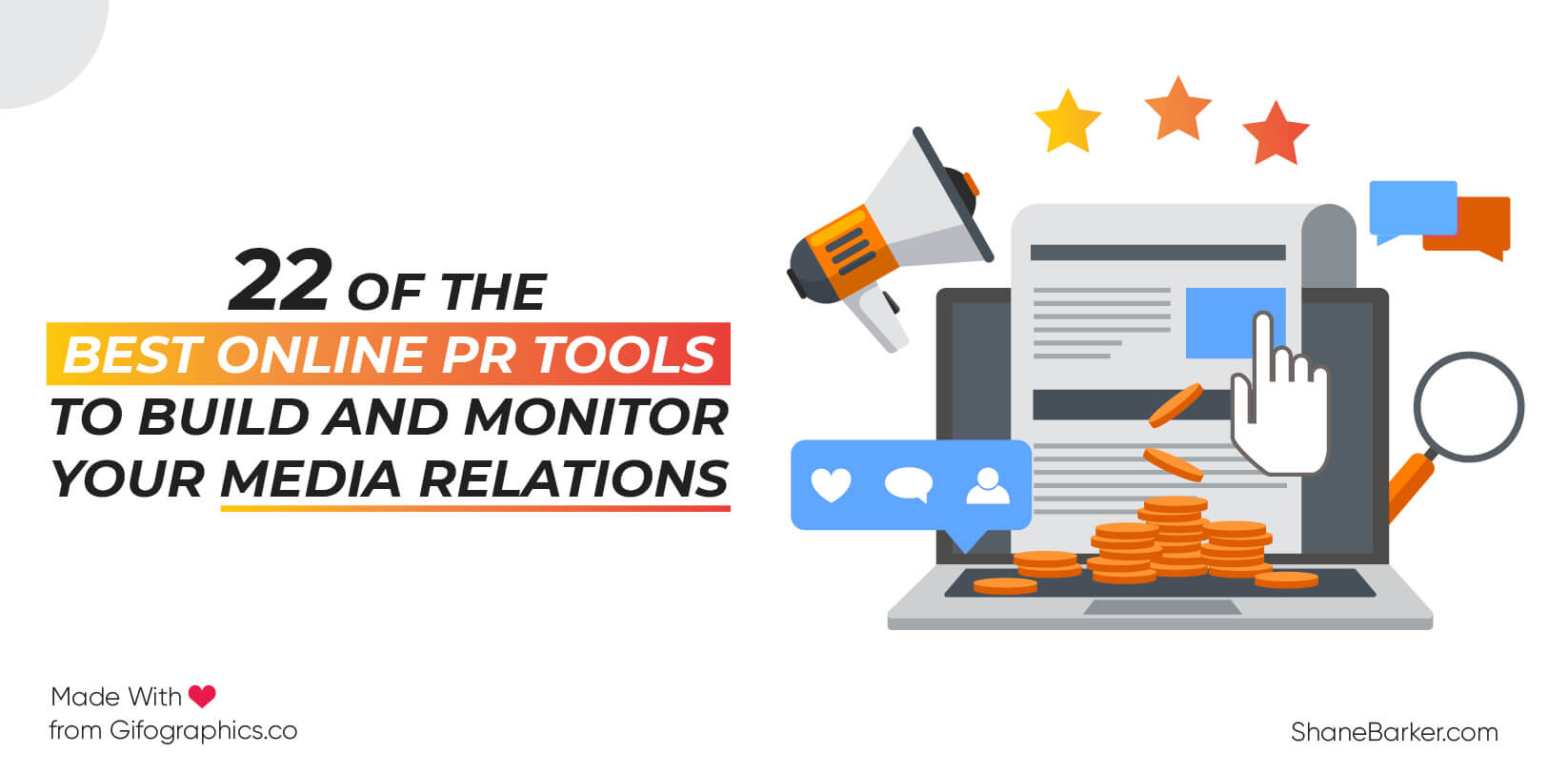
![digital marketing for startups: the strategies to use in [year] 11 best digital marketing strategies for startups](https://shanebarker.com/wp-content/uploads/2021/09/best-digital-marketing-strategies-for-startups.png)
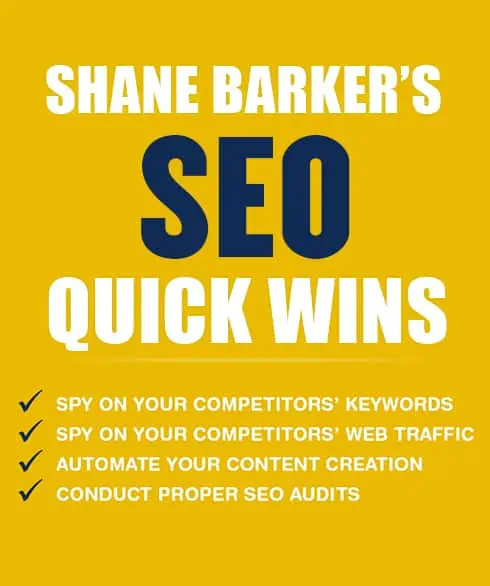
All great suggestions, thanks Shane!
I just read this blog. It provided me a clear understanding of Strategies using for the promotion of mobile apps. Thanks for sharing this valuable information.
Thanks for sharing the information.
My pleasure. Glad to help!
Awesome article and very helpful for those who really want to promote their apps.
I’m glad my article on mobile app promotion strategies was helpful for you. Thank you!